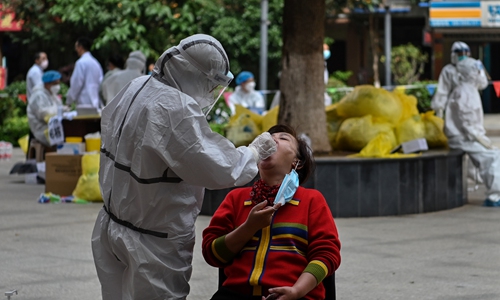Wuhan tests 3m, to finish citywide tests by May 20
By Zhang Hui Source:Global Times Published: 2020/5/15 12:38:40

A medical worker takes a swab sample from a man being tested for the COVID-19 in Wuhan,Central China's Hubei Province, on Friday. Photo: AFP
The government of Wuhan, the region of China worst hit by COVID-19, announced on Thursday that it will expand nucleic acid testing to cover all of its 11 million residents. It aims to estimate the number of asymptomatic carriers in the city after testing 3 million residents last month.
Wuhan has been reporting up to a dozen asymptomatic infections each day since the beginning of May, which has triggered public concern despite silent carriers being separated for treatment, the government said.
In order to create a safe and healthy environment for the resumption of work, production and schools, Wuhan has decided to expand its nucleic acid testing and intensify the screening and treatment of asymptomatic carriers.
Citywide testing will prioritize permanent and temporary residents in the city who have not yet been tested for the novel coronavirus, residents in communities previously hit by the virus, and residents in old and densely populated communities.
Nucleic acid testing is an important tool for virus prevention and control and is conducive to the early detection and treatment of confirmed cases, as well as the early detection and isolation of asymptomatic carriers. Wuhan has been carrying out nucleic acid testing for key groups since April, which has proven to be an effective measure, according to the government.
The district government and doctors in Wuhan told the Global Times previously that some districts began mass testing on Wednesday, and testing will continue until May 20.
A resident surnamed Wang in Qiaokou district in Wuhan, who took free nucleic acid tests on Wednesday, told the Global Times on Thursday that residents in her community were organized by local community committee workers to go through the test in the outdoor community garden after registering their identification.
"It only took about 15 minutes. I lined up in the garden and then a nurse took a sample from my throat and it was done," Wang said.
She has not checked the results yet. She said it's her second test, and she tested last month before resuming work and got the results from a mobile application in 24 hours.
Some Wuhan residents said the citywide tests make them feel safe, but they are also worried that the city may not have enough medics and nucleic acid test kits. Wang said she saw some communities recruiting nurses for the tests.
Not just residents in communities, hospitals are also testing their patients.
Peng Zhiyong, director of the intensive care unit of the Zhongnan Hospital of Wuhan University, told the Global Times on Thursday that his hospital is testing all patients, and each patient has to take nucleic acid test twice.
He said that tests could assure residents, as many were concerned about the risk of a resurgence of COVID-19 in Wuhan.
Wang Peiyu, deputy head of Peking University's School of Public Health, told the Global Times that citywide tests in Wuhan are significant to estimate the proportion of the population infected in the country's worst-hit region, especially figuring out the number of asymptomatic carriers to prevent a possible second wave of epidemic.
"There is still a lot we don't know about asymptomatic infections, and it's possible that those silent carriers could infect a large number of communities," Wang said.
He said Wuhan's test results could offer a reference for other provinces and cities in estimating the total infected proportion, and adjust prevention and control measures based on the results.
Posted in: SOCIETY